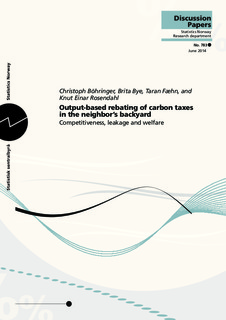| dc.contributor.author | Böhringer, Christoph | |
| dc.contributor.author | Bye, Brita | |
| dc.contributor.author | Fæhn, Taran | |
| dc.contributor.author | Rosendahl, Knut Einar | |
| dc.coverage.spatial | Canada | nb_NO |
| dc.date.accessioned | 2019-11-11T12:05:59Z | |
| dc.date.available | 2019-11-11T12:05:59Z | |
| dc.date.issued | 2014-06 | |
| dc.identifier.issn | 1892-753X | |
| dc.identifier.uri | http://hdl.handle.net/11250/2627701 | |
| dc.description.abstract | We investigate how carbon taxes combined with output-based rebating (OBR) in an open economy perform in interaction with the carbon policies of a large neighboring trading partner. Analytical results suggest that whether the purpose of the OBR policy is to compensate firms for carbon tax burdens or to maximize welfare (accounting for global emission reductions), the second-best OBR rate should be positive in most cases. Further, it should fall with the introduction of carbon taxation in the neighboring country, particularly if the neighbor refrains from OBR. Numerical simulations for Canada with the US as the neighboring trading partner, indicates that the impact of US policies on the second-best OBR rate will depend crucially on the purpose of the domestic OBR policies. If the aim is to restore the competitiveness of domestic emission-intensive, trade exposed (EITE) firms at the same level as before the introduction of its own carbon taxation for a given US carbon policy, we find that the domestic optimal OBR rates are relatively insensitive to the foreign carbon policies. If the aim is to compensate the firms for actions taken by the US following a Canadian carbon tax, the necessary domestic OBR rates will be lower if also the US regulates its emissions, particularly if the US refrains from OBR. If the goal is rather to increase the efficiency of Canadian policies in an economy-wide sense by accounting for carbon leakage, the US policies have but a minor reducing impact on domestic optimal OBR rates. | nb_NO |
| dc.description.sponsorship | Research Council of Norway University of Oslo European Community’s Seventh Framework Programme (FP7/2007-2013) (grant agreement No 270089) Stiftung Mercator (ZentraClim) | nb_NO |
| dc.language.iso | eng | nb_NO |
| dc.publisher | Statistisk sentralbyrå | nb_NO |
| dc.relation.ispartofseries | Discussion papers;783 | |
| dc.subject | JEL classification: Q43 | nb_NO |
| dc.subject | JEL classification: Q54 | nb_NO |
| dc.subject | JEL classification: H2 | nb_NO |
| dc.subject | JEL classification: D61 | nb_NO |
| dc.title | Output-based rebating of carbon taxes in the neighbor’s backyard. Competitiveness, leakage and welfare | nb_NO |
| dc.type | Working paper | nb_NO |
| dc.description.version | publishedVersion | nb_NO |
| dc.subject.nsi | VDP::Matematikk og Naturvitenskap: 400::Matematikk: 410::Statistikk: 412 | nb_NO |
